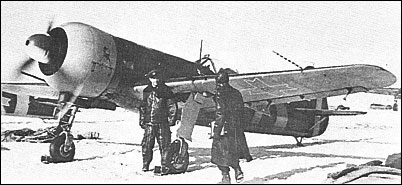|
| Expansion of the operational versatility of the basic
I.A.R.80 design to embrace the fighter-bomber and dive
bomber tasks resulted in the I.A.R.81, which was to fly
its first operational sorties in the Ukraine on 15 October 1941. The 25th production I. A.R.80A was taken from the
line to serve as a prototype, fitted with two wing racks
for 50kg bombs and a ventral crutch for a 225kg bomb. Introduction of the crutch dictated
modifications to the main undercarriage members and
an automatic flap actuating device was introduced.
The dual fighter-bomber and dive bomber version became
known as the BoPi, an acronym for Bombardier in
Picaj, or dive bomber. The I.A.R.81 retained the sextet
of 7.92mm FN-Browning guns and could carry three
100kg bombs, or one 225kg and two
50kg bombs. Fifty I.A.R.81s were followed by a
batch of 10 I.A.R.81As, which, like the final 10 I.A.R.81s,
had an armament of two 13.2mm and four 7.92mm
guns, and these proved to be the last of the BoPi aircraft.
The next production version, the I.A.R.81C, was a
pure fighter and was to be built in larger numbers than
any I. A.R. 80 variant. Essentially similar to the I.A.R.80C
apart from having the Ikaria cannon replaced by the
superior Mauser MG 151 and retaining only two
7.92mm guns, the I.A.R.81C was, like other versions of
the I.A.R.81, powered by the I.A.R.-K 14-1000A engine. A total of 161 I.A.R.81Cs was built by late 1943 when
licence manufacture of the Bf 109G-6 took over.
| WEIGHTS |
| Take-off weight | 3070 kg | 6768 lb |
| Empty weight | 2125 kg | 4685 lb |
| DIMENSIONS |
| Wingspan | 10.52 m | 35 ft 6 in |
| Length | 8.97 m | 29 ft 5 in |
| Height | 3.60 m | 12 ft 10 in |
| Wing area | 16.00 m2 | 172.22 sq ft |
| PERFORMANCE |
| Max. speed | 542 km/h | 337 mph |
| Range | 1030 km | 640 miles |
| lxbfYeaa, e-mail, 17.01.2026 20:04 20 reply | | lxbfYeaa, e-mail, 17.01.2026 20:04 20 reply | | lxbfYeaa, e-mail, 07.11.2025 02:36 20 reply |
| lxbfYeaa, e-mail, 14.03.2024 05:16 20 reply | |
| | lxbfYeaa, e-mail, 14.03.2024 05:16 20 reply | | bombardier, e-mail, 22.05.2011 20:06 The Romanians actually tried to improve it,the first attempt was to fit it with a Jumo 211 of 1450hp unfortunately the engine caused so many vibrations that rendered the aircraft unflyable,the other attempt was to fit it with a 1600hp BMW801 however BMW could barely keep up with the German demands for the 801 and the Germans did not allow license production of the engine reply |
| Relu, 30.10.2010 08:04 The IAR 80 was a Romanian World War II low-wing, monoplane, all-metal construction fighter aircraft. When it first flew, in 1939, it was comparable to most contemporary designs like the German Bf 109E, the British Hawker Hurricane and the Supermarine Spitfire. However, production problems and lack of available armament delayed entry of the IAR 80 into service until 1941. It was forced to remain in front-line use until 1944, when – even if for some aspects outdated – it still could compete under certain conditions with more modern aircraft such as the Lockheed P-38 Lightning. reply | | Laurence, e-mail, 29.05.2009 01:24 It is a handy plane to fly in some early missions in IL246 Hyperlobby it has a slow roll rate however but is well armed and takes plenty of punishment a real surprize. reply | | Kyrios, e-mail, 26.05.2009 15:34 I think it is better than a lot of planes from 30s and 40s. Sad that IAR didn't keep pace with constructing new planes.
/ /sorry for my english ;) reply | | Max, e-mail, 21.11.2008 18:53 Excellent design, very nice performances. Nice piece of engineering. reply | | Tom, e-mail, 16.11.2008 13:22 I like this plane, it is excellent in both roles - in bombing - it has good maneuverability and payload, in dogfights - good maneuverability and not bad armament. This is a very good plane. reply | | dorel, e-mail, 05.07.2008 22:46 Very good! reply |
|
Do you have any comments?
|
| 
COMPANY
PROFILE
All the World's Rotorcraft
|






 bombardier
bombardier
20
reply